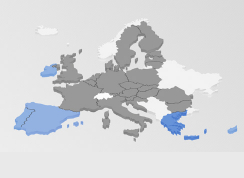Former programmes
Former programmes
Ireland (EFSF)

The Irish economy grew strongly in 2021 as it recovered from the pandemic, aided by strong exports and a rebound in domestic demand. Fiscal policy remained supportive, and growth helped reduce the deficit-to-GDP ratio. Low borrowing costs and fiscal overperformance allowed Ireland to maintain a fairly favourable fiscal position and sizeable year-end cash buffers. Irish banks’ financial positions remained sound, with profitability improving.
Greece (EFSF and ESM)

The Greek economy recovered vigorously from the pandemic, driven by strong domestic demand and tourism. The budget deficit accommodated a large package of fiscal support to households and firms. Market conditions remained favourable, supported by the ECB’s accommodative monetary policy stance and the NGEU recovery plan. Meanwhile, banks strengthened their balance sheets.
Spain (ESM)

After the sharp recession of 2020, Spain returned to economic growth in 2021. A successful Covid-19 vaccination strategy helped mitigate the health and economic impact of the pandemic. Prompt policy support to firms and households dampened the pandemic shock but affected public finances. Nevertheless, the Spanish Treasury benefitted from favourable market access conditions, supported by monetary policy and investor’s confidence. Spanish banks’ profitability and capital ratios have improved since the pandemic, thanks to policy support measures as well as to balance sheet enhancements over the last decade.
Cyprus (ESM)

The Cypriot economy staged a strong recovery in 2021 from the impact of Covid-19, slightly surpassing the euro area average. This rebound helped reduce the budget deficit, even while pandemic-related fiscal support continued to be offered to households and businesses. Cyprus enjoyed overall favourable financing conditions backed by an accommodative monetary policy stance and began to reduce its precautionary liquidity buffer towards pre-pandemic levels. Banks’ NPLs shrank and profitability recovered, but asset quality concerns remain until the full impact of the pandemic is known. Completing structural reforms in several areas would boost the country’s growth potential. Read more…
Portugal (EFSF)

In 2021, private consumption and investment supported Portugal’s partial recovery from the economic downturn induced by the Covid-19 pandemic. A rebound in fiscal revenue led to a reduction in the primary deficit. Government bond yields increased on the back of rising euro area inflation expectations, but market access conditions remained favourable mainly thanks to accommodative monetary policy. Portuguese banks’ profitability has recovered and NPLs have declined further. Read more…

